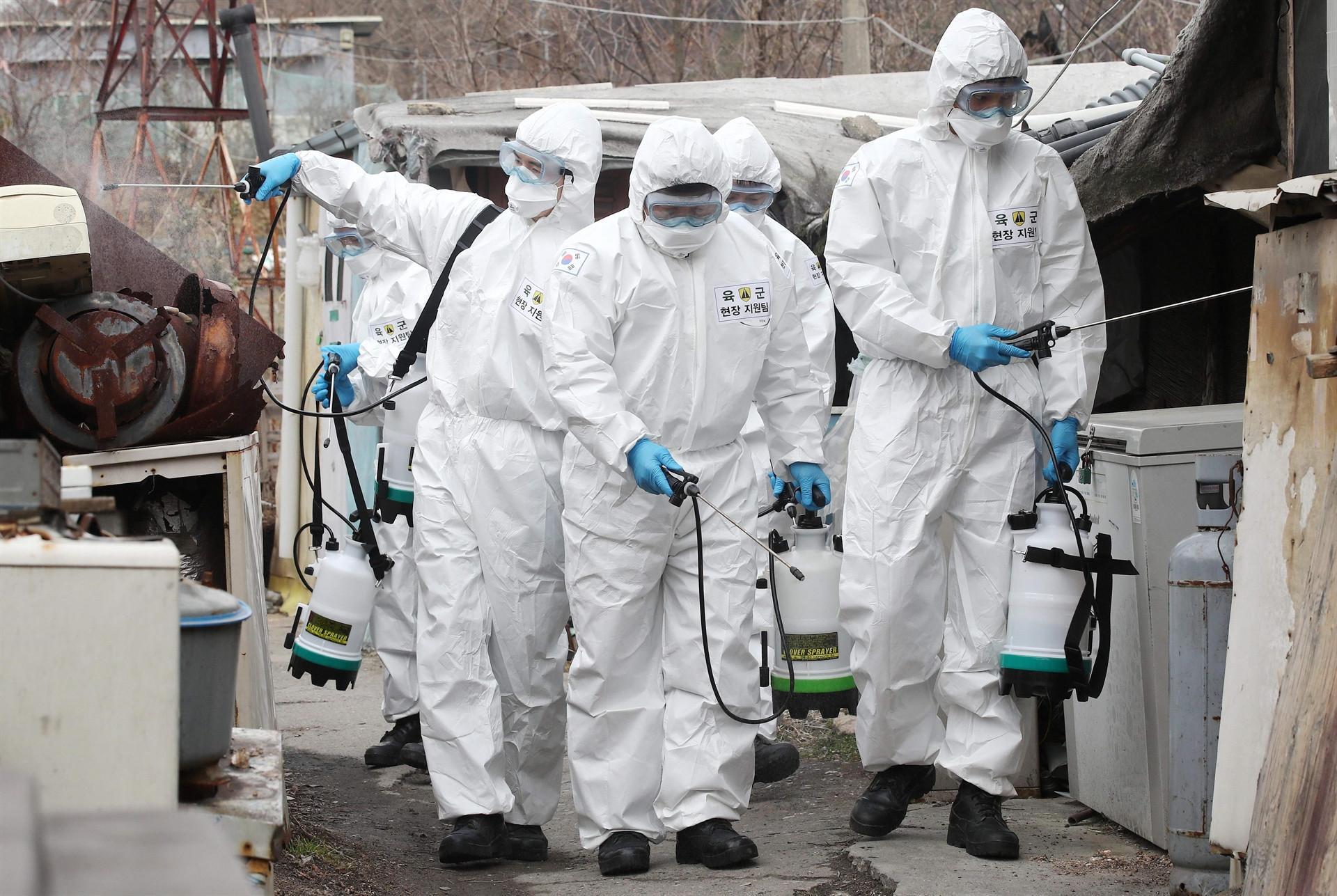
South Korean soldiers wearing protective gear spray disinfectant as part of preventive measures against the spread of the COVID-19 coronavirus, at Guryong village in Seoul, on March 3, 2020. (Photo by YONHAP via AFP)
Chinese authorities on March 3 asked overseas Chinese to reconsider or minimise their travel plans as the coronavirus epidemic spreads across the world and prompts an uptick of imported cases arriving in the country.
Travellers from countries with severe coronavirus outbreaks who arrive in Guangdong province, an economic and export powerhouse in the south, must undergo a 14-day quarantine - state media reported on March 3.
The financial hub of Shanghai will also require all people, regardless of nationality, to remain in quarantine for 14 days if they have travelled to the city from a country with "relatively serious virus conditions", an official said.
Dandong, the northern Chinese city which borders North Korea, said it would test all visitors who arrived in the city from Feb. 12. Those who arrived from Feb. 28 will be tested at designated hotels where they can undergo quarantine if infected.
"We are trying to distance ourselves from the virus, but what cannot be broken is the flesh and blood relationships between overseas Chinese and their families in their hometowns," said the government of Qingtian county in the southeastern Zhejiang province.
It added that travelling was the easiest way for cross-infections to happen, describing staying home as the "best form of protection".
"For the sake of your family's health and safety, please strengthen your precautions, carefully decide on your travel plans and minimise mobility," it said.
The number of new daily infections overseas now exceeded new cases in China, with Italy, South Korea and Iran focal points.
Mainland China had 125 new confirmed cases of coronavirus infections on March 2, the National Health Commission said on March 3, down from 202 cases a day earlier and the lowest since the authority started publishing nationwide data in January.
Excluding cases in Hubei province, where the outbreak first started, there were 11 new cases in mainland China on March 2.
Seven of the new cases were imported, involving Chinese nationals who had travelled from Italy to Qingtian county.
The seven people had close contact with a previously disclosed case and all eight worked together in a restaurant in Bergamo, a city in the Lombardy region of northern Italy, the Qingtian government said in a statement on its WeChat account.
Last week, six of them took a flight from Milan to Shanghai, stopping over in Moscow, while the seventh flew via Germany to Shanghai. They tested positive for the coronavirus on March 2 after arriving in Qingtian.
None of them had been to Hubei province or its capital Wuhan, the Qingtian government said.
China has said it will focus on preventing those infected with coronavirus from crossing borders, as other imported cases had arrived in the country last week.
China's new confirmed cases of coronavirus infections on March 2 was driven by a further decline in new confirmed cases in Wuhan, the city hit hardest by the pathogen in China.
New cases in Wuhan fell to 111 from 193 a day earlier, and accounted for almost all of the 114 new infections in central Hubei province on Monday.
Excluding Hubei, there were 11 new cases in mainland China on March 2, bringing the total number of confirmed cases in mainland China so far to 80,151.
The death toll from the outbreak in mainland China had reached 2,943 as of the end of March 2, up by 31 from the previous day.
Virus spreading fast but stigma is more dangerous
In the meantime, the World Health Organization (WHO) said on March 2 that the coronavirus now appears to be spreading much more rapidly outside China than within but can still be contained, and stigma is more dangerous than the disease itself.
WHO chief Tedros Adhanom Ghebreyesus said almost nine times as many cases had been reported in China as outside in the previous 24 hours, adding that the risk of coronavirus spreading was now very high at a "global level".
He said outbreaks in South Korea, Italy, Iran and Japan were the greatest concern, but that there was evidence that close surveillance was working in South Korea, the worst affected country outside China, and the epidemic could be contained there.
"Stigma, to be honest, is more dangerous than the virus itself. Let's really underline that. Stigma is the most dangerous enemy," he told a news briefing in Geneva.
He said the fight against the coronavirus should become a bridge for peace, commending the United States for supporting sending medical aid to Iran despite the tensions between them.
"I think we have a common enemy now," he said.